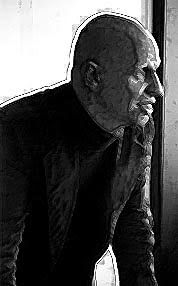Instead of implying, the poem ranted
In an essay on modernism and postmodernism in American poetry, David Antin quoted a passage from Allen Ginsberg's "America" and then pondered the contemporary response among "'establishment' critics" of the 1950s. How did Ginsberg's antic style strike them? From the later vantage (Antin was writing in the late 1970s) it is hard for us to remember that Ginsberg's writing seemed unliterary. The fact is that when we read Ginsberg today we assume that, whatever else his language is, it is at least literary. "America the plum blossoms are falling" — indeed!
America stop pushing I know what I'm doing
America the plum blossoms are falling
I haven't read the newspapers for months everyday some-
body goes on trial for murder.
America I feel sentimental about the Wobblies
America I used to be a communist when I was a kid I'm
not sorry
I smoke marijuana every chance I get.
I sit in my house for days on end and star at roses in
the closet
When I go to Chinatown I get drunk and never get laid
("America")
 Here's Antin: "The success of the style can be measured by the degree to which the 'establishment' critics responded to this poetry as anti-poetry, anti-literature, and as sociopolitical tract. While there may have been contributory factors in the political climate of the Cold War and [Ginsberg's] own mania, it is still hard to believe that this alternately prophetic, rhapsodic, comic, and nostalgic style could appear unliterary. But it did appear unliterary, primarily because the appropriate devices for framing 'Modern' poetry and literature in general were nowhere in sight. Instead of 'irony,' it had broad parody and sarcasm; instead of implying, the poem ranted and bawled and laughed; learned as it was in the strategies of European poetry it was seen as the poetry of the gutter."
Here's Antin: "The success of the style can be measured by the degree to which the 'establishment' critics responded to this poetry as anti-poetry, anti-literature, and as sociopolitical tract. While there may have been contributory factors in the political climate of the Cold War and [Ginsberg's] own mania, it is still hard to believe that this alternately prophetic, rhapsodic, comic, and nostalgic style could appear unliterary. But it did appear unliterary, primarily because the appropriate devices for framing 'Modern' poetry and literature in general were nowhere in sight. Instead of 'irony,' it had broad parody and sarcasm; instead of implying, the poem ranted and bawled and laughed; learned as it was in the strategies of European poetry it was seen as the poetry of the gutter."
(The essay's title is "Modernism and Postmodernism: Approaching the Present in American Poetry.")